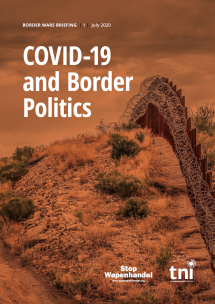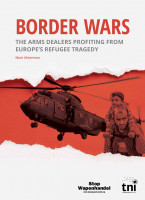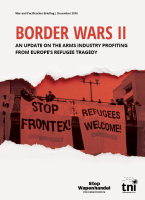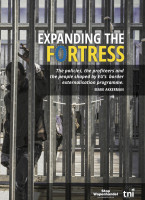COVID-19 and border politics
Topics
Publication date:
This briefing takes a look at the consequences of the COVID-19 pandemic for refugees and migrants and its anticipated influence on the border security and control market. What are the direct effects on migrants and refugees who are already living in vulnerable situations? What does it mean for people crossing international borders, seeking asylum and transiting the deadly and treacherous migrant routes across regions, continents and seas? And how are they affected by government responses to the outbreak?

Downloads
-
COVID-19 and border politics (PDF, 1.21 MB)Average time to read: 20 minutes minutes
-
COVID-19 y políticas fronterizas (PDF, 1.2 MB)Average time to read: 20 minutes minutes
Authors
Key points
- Refugees and migrants are disproportionately affected by COVID-19
- Crowded refugee camps and poor living conditions have led to outbreaks in France, Algeria, Bangladesh, Kenya, Lebanon.
- Those in detention camps (UK, Australia and US) have experienced outbreaks, increased isolation, or maltreatment due to lockdown measures
- Migrant workers in sectors considered ‘essential’ by governments, such as slaughterhouses, have received less health protection measures and been more likely to be exposed to the virus
- Deportations of migrants (US and Saudi Arabia) have led to the spread of coronavirus infections to low-income countries with limited resources to respond
- Migrant workers, and particularly undocumented workers, have been more likely to lose jobs or income due to the pandemic, and less likely to receive medical and social support
- COVID-19 has led to an unprecedented shutdown of borders and restrictions on migration (91% of the global population live in countries with restrictions on international arrivals, 39% in countries with completely closed borders)
- There has been an increase in violent pushbacks of refugees on borders (Croatia), immediate refusals of asylum-seekers (US), raids on migrant camps (Malaysia) as well closure of ports, including to rescue vessels (Italy, Malta), that has led to increased deaths in already deadly regions such as the Mediterranean
- Racist media outlets, organisations, far-right parties and governments (US, Israel, Brazil, Iran, Hungary) have used the crisis to stoke xenophobic sentiments
- Border militarisation has intensified using the excuse of COVID-19, leading to increased troops and hardware deployed on many borders worldwide (US, Peru, Ecuador, Colombia, Brazil, Greece, Poland, Czech Republic, Latvia, Lithuania, the Netherlands, North Macedonia, Portugal, Slovakia and Slovenia)
- There is a danger that many of these draconian restrictions, justified by governments as temporary health measures, will become permanent even as the pandemic subsides in the same way as civil liberty restrictions remained in place long after 9/11
- Amidst the pandemic, EU, US, Australia and others have continued to pour billions into fortifying borders, strengthening border patrol agencies (CBP, Frontex) and funding often authoritarian third countries to stop migration reaching their shores. The EU proposed significantly increasing budgets for border security in the wake of Covid-19
- Corporations have also continued to receive record levels of border control contracts, in particular arms companies, IT and biometric firms. Many of the companies winning contracts for surveilling, monitoring and tracking migrants have also pitched their same technologies for health and policing related to Covid-19. They will be one of the few winners of the COVID-19 fuelled border militarisation bonanza.




